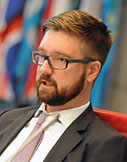
Ulrich Kühn is a nonresident scholar at the Carnegie Endowment for International Peace, and the head of the arms control and emerging technologies program at the Institute for Peace Research and Security Policy at the University of Hamburg. Previously, he was a senior research associate at the Vienna Center for Disarmament and Non-Proliferation (VCDNP)/James Martin Center for Nonproliferation Studies and a Stanton Nuclear Security Fellow with Carnegie’s Nuclear Policy Program. He holds a PhD (summa cum laude) in political sciences from Hamburg University, an MA in Peace Research and Security Policy from Hamburg University, and a Magister Artium in medieval and newer history as well as German literature from the Rheinische Friedrich Wilhelms University Bonn. His current research focuses on NATO-Russian relations, transatlantic security, nuclear and conventional deterrence and arms control, and the proceedings of the OSCE.
Kühn worked for the German Federal Foreign Office and was awarded United Nations Fellow on Disarmament in 2011. He is the founder and a permanent member of the trilateral Deep Cuts Commission and an alumnus of the ZEIT Foundation Ebelin und Gerd Bucerius.
His articles and commentary have appeared in Foreign Affairs, the New York Times, the Bulletin of the Atomic Scientists, the Washington Quarterly, and War on the Rocks.
Shortly after the election of Donald Trump as U.S. president in November 2016, several prominent German politicians, journalists, and scholars began to discuss whether Germany ought to explore options in case of U.S. retrenchment of its security guarantees.